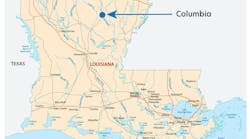The issue of exporting heavy California crude oil has independent West Coast refiners and producers at odds.
Producers, saying the market for heavy oil is weak, have sought a waiver to federal laws banning crude exports, They convinced Congress to order a study of the issue as part of a 1988 trade bill.
Last January a federal task force recommended exports increasing from 15,000 to 25,000 b/d during 3 years for California crude of 20 gravity or less (OGJ, Jan. 22, Newsletter). President Bush has yet to act on that recommendation.
Last week a House of Representatives foreign affairs subcommittee heard small refiners challenge the economics of exports.
COMMERCE STUDY
John Richards of the U.S. Commerce Department's bureau of export administration said the federal task force study found that integrated oil companies dominate the California oil market, with more than 79% of production and 75% of refining capacity.
Independent producers without access to the one major common carrier pipeline, the Four Corners System, sell crude to integrated oil companies at the posted price.
The heavy crude brings as little as $2/bbl less than the price of West Texas intermediate after an adjustment for transportation and quality differences.
Richards said, "We determined that if small producers are unable to market crude oil because of limited marketing options, they could be forced to abandon their wells and/or continue the trend established in the early 1980s of selling oil producing properties to large integrated firms.
"This development would continue to result in a reduction in the supply of crude oil available to small independent refiners, thereby jeopardizing their financial viability."
The study found that heavy crude supplies exceed the California refining industry's capability to process it into transportation fuels, and much of it is processed into residual/bunker fuels for export. In 1988, about 106,000 b/d of resid and 110,000 b/d of bunker fuel were sold to non-U.S, ships in California harbors.
The study said exports of 25,000 b/d would not harm California refiners, and substitution of natural gas for heavy oil in San Joaquin Valley thermal oil recovery projects could free as much as 50,000 b/d of heavy crude.
INDEPENDENTS AGREE
James C. Hall, president of Drilling & Production Co. and president of the California Independent Petroleum Association (CIPA) said, "Our producers want to remain competitive in today's aggressive world market while operating in perhaps the most difficult location in the world: California."
Hall said West Texas intermediate was posted at $19.50/bbl Mar. 28 and, adjusted for gravity, California Midway Sunset crude should have sold for $16 but was posted at $14.25.
Hall pointed out that California crude has stiff competition from Alaskan North Slope (ANS) production.
"Prior to 1986," he said, crude oil prices were high enough that ANS crude could be profitably shipped to the Gulf Coast. The windfall profits tax allowed the otherwise excessive shipping costs (to the Gulf Coast) as a deduction.
"This situation changed dramatically in 1986 when falling oil prices dropped below the tax threshold, making the West Coast the preferred offloading point for ANS crude."
Moreover, he said, there is less opportunity to sell crude on the West Coast partly because majors are able to supply most of their own refinery runs.
Hall argued that exports will not harm independent refiners because supplies will be adequate and stringent pollution control and land use regulations will block any expansion of the refining industry to accommodate increasing high sulfur, heavy oil production.
He said although the Four Corners pipeline has space to move surplus California oil, Midcontinent refiners also are unable to process the heavy crude, and the price differential is more than $4/bbl.
ECONOMICS CHALLENGED
William Kitto, vice-president of U.S. Oil & Refining Co., testified for the American Independent Refiners Association.
He warned that exports would force California oil prices higher, which is what happened when January natural gas shortages forced oil producers to burn 40,000 b/d of heavy oil for their production processes.
He said refiners are developing markets for high value, high specialty products that can be refined from San Joaquin Valley crude.
Kitto argued that exports will increase tanker traffic off California because 1.3 bbl of lighter ANS crude will have to be shipped in to replace each barrel of heavy crude exported.
John Dosher, senior vice-president of Pace Consultants Inc., cited flaws in the task force study. He said crude exports would not displace exports of residual fuel, and producers would profit more by selling their heavy oil through Four Corners.
And he said replacing California heavy with ANS would cost independent refiners about $2.85/bbl more with no increase in products.
Also testifying was Robert Milk, president of Celeron Corp., operator of the All American Pipeline from Gavoita, Calif., to West Texas. All American connects with Four Corners.
Milk said, ,All American can easily accommodate any volumes of heavy California crude oil that realistically might be tendered to it."
All American shipments of California crude are 65,000 b/d and could be increased to 100,000 b/d without buying light blendstock, he said.
Copyright 1990 Oil & Gas Journal. All Rights Reserved.
